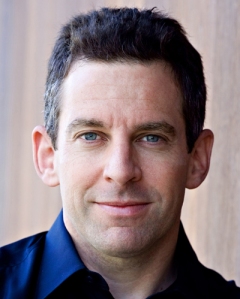
There’s a new volley in the ongoing feud between Sam Harris and people who question his crusade against Islam. During a discussion at the Harvard Science Center, Harris made the claim that Muslim violence is different than any other religious violence. He maintained that when any other religionists commit violent acts, they are individuals committing violent acts unrelated to their faith’s doctrines and “articles of faith”. Islam’s articles of faith were uniquely different.
He used as an example the brutality perpetrated against Muslims by Zen warrior-monks, and ended up making this argument that their violence wasn’t religious violence:
“Now, the truth is it was never pure Zen. It was Zen mixed with Shinto mixed with a kind of Japanese nationalism and war ethic. So it was a weird brew, but it was not at all a surprise that certain Zen teachings, which do not emphasize compassion to the degree that most Buddhist teachings do, could be spun into this sort of martial ethic.” (italics mine)
If this prompts a “Wait … what?” response, I would not be surprised. That was certainly my reaction. Though he has just taken pains to acknowledge that Buddhist on Muslim violence is “a weird brew” caused by external influences and artful interpretation of certain teachings, Harris then faults others for making the same argument in the case of Islam. I’ve studied both Buddhist scriptures and the Qur’an and what stands out in both cases (as in examples of Hindu or Jewish or Christian violence) is that given the preponderance of teachings on compassion in all of those faiths, believers feel they have any wiggle room to “spin” certain teachings into a “martial ethic”.
In that context, I found these remarks bemusing:
“The crucial difference with Maajid [Nawaz a Muslim reformer], though, is that he admits there is a problem, and he admits there is a unique problem in the Muslim world now, and he admits there is a connection between a certain construal of doctrine and the kind of violence and oppression we see in the Muslim world. He doesn’t lie or obfuscate any of that.”
“That is a distinction between him and someone like Glenn Greenwald, who is just out to lunch as a liberal, and Reza Aslan, who pretends to be an expounder of Islam as it is, but just plays hide the ball with the articles of faith as quickly and dexterously as he can.”
 Did you catch that? The key phrase above is “a certain construal”. Well, yes. Of course, Muslims who commit violence in the name of their faith are construing their doctrines in a “certain” way. And that is exactly what everyone from Ben Affleck to Reza Aslan to Neil DeGrasse Tyson to anthropologist Scott Atran have argued. It is the same argument, in fact, that Harris himself, uses to explain that the Zen warriors are not violent because they are Buddhists, but because of “a certain construal” of Zen teachings.
Did you catch that? The key phrase above is “a certain construal”. Well, yes. Of course, Muslims who commit violence in the name of their faith are construing their doctrines in a “certain” way. And that is exactly what everyone from Ben Affleck to Reza Aslan to Neil DeGrasse Tyson to anthropologist Scott Atran have argued. It is the same argument, in fact, that Harris himself, uses to explain that the Zen warriors are not violent because they are Buddhists, but because of “a certain construal” of Zen teachings.
Harris’ contention that this is different from other faiths is demonstrably false and the evidence of that falsity is everywhere. I read an article only today in which a politician opined that, sure Columbus enslaved people, but that was better than killing them (he also did that) and his barbarism was balanced by the fact that he shared the Gospel with them (actually, he forced them to accept something called The Requirement). His men not only enslaved their victims, they raped their women and girls, maimed them in horrific ways, and, yes, slaughtered them. They believed they did this (or claimed they believed it) in answer to their own articles of faith.
Columbus’ atrocities are possible only with “a certain construal” that Christ’s exhortation to His disciples to share the Gospel somehow exists apart from His words about love, compassion, meekness, treating others as we would be treated, and turning the other cheek. Likewise, His refusal to let Peter protect Him with the sword—accompanied by the words “He who lives by the sword will perish by the sword”.
I also have had more than one Christian tell me (as recently as last week) that, of course it was appropriate for Christians to be violent in the discharge of their duties as Christians—after all, didn’t Jesus say, “I have come not to bring peace, but a sword?” They also cite the wars of conquest the Hebrews fought in which they simply wiped other tribes from the face of the earth. (Never mind that minor prophets like Ezekiel and Jeremiah—whom I like to think of as the Course Correctors—had harsh words to say about such genocidal behavior.)
Likewise it takes “a certain construal” to see Muhammad’s exhortation to fight against the oppressors of His nascent community as His articles of faith. He did not construe them as such, nor do most of the Muslims in the world. Just as Christ’s articles of faith are defined by His statement that the two greatest commandments are to love God and love one’s neighbor, Muhammad concisely describes the believer who projects public piety while refusing to do small kindnesses to others as one who has belied religion.
Here are the scriptural references for comparison:
Then one of them, which was a lawyer, asked him a question, tempting him, and saying, Master, which is the great commandment in the law? Jesus said unto him, Thou shalt love the Lord thy God with all thy heart, and with all thy soul, and with all thy mind. This is the first and great commandment. And the second is like unto it, Thou shalt love thy neighbour as thyself. On these two commandments hang all the law and the prophets. — Matthew 22:35-40
But I say to you who listen: Love your enemies, do good to those who hate you, bless those who curse you, pray for those who mistreat you. If anyone hits you on the cheek, offer the other also. And if anyone takes away your coat, don’t hold back your shirt either. Give to everyone who asks from you, and from one who takes away your things, don’t ask for them back. Just as you want others to do for you, do the same for them. — Luke 6: 28-31
Let there be no compulsion in religion: Truth stands out clear from Error: whoever rejects evil and believes in God hath grasped the most trustworthy hand-hold, that never breaks. And God heareth and knoweth all things. — Quran, Surih 2:256
O ye who believe! Be steadfast witnesses for Allah in equity, and let not hatred of any people seduce you that ye deal not justly. Deal justly, that is nearer to your duty. Observe your duty to Allah. Lo! Allah is Informed of what ye do. — Surih 5:9
Hast thou observed him who belieth religion? That is he who repelleth the orphan, and urgeth not the feeding of the needy. Ah, woe unto worshippers who are heedless of their prayer; who would be seen (at worship) yet refuse small kindnesses! — Qur’an, Surih 107:1-7
 It has been noted elsewhere, repeatedly, that the rules and guidelines Muhammad gave His followers for conducting warfare were far less atrocious than the peoples they were fighting—including the Christian Crusaders, or Columbus, or yes, ISIS. Harris speaks as if he has never read the Qur’an or, having read it, has no idea of its historical context or what really constitute its articles of faith.
It has been noted elsewhere, repeatedly, that the rules and guidelines Muhammad gave His followers for conducting warfare were far less atrocious than the peoples they were fighting—including the Christian Crusaders, or Columbus, or yes, ISIS. Harris speaks as if he has never read the Qur’an or, having read it, has no idea of its historical context or what really constitute its articles of faith.
The passage most often used to justify the description of Islam as an inherently violent faith (and I suspect used as well by groups like ISIS to justify their violence) is this one:
“Fight in the way of Allah against those who fight against you, but begin not hostilities. Lo! Allah loveth not aggressors. And slay them wherever ye find them, and drive them out of the places whence they drove you out, for persecution is worse than slaughter. And fight not with them at the Inviolable Place of Worship until they first attack you there, but if they attack you (there) then slay them. Such is the reward of disbelievers. But if they desist, then lo! Allah is Forgiving, Merciful. And fight them until persecution is no more, and religion is for Allah. But if they desist, then let there be no hostility except against wrong-doers.” — Quran, Surih 2:190-193
What is the context for this call to arms? Think 9/11, but with bombings that happened not once, but repeatedly. Think of ISIS, pouring out of Syria into parts of Iraq, devastating “other” Muslims or the Yazidis. Ask yourself if Muhammad’s call to arms is a reasonable response to the threat of being wiped out to the last child. That is what the community of Muslims was facing at the hands of the pagan tribes and the Jews who had earlier promoted friendly ties with the new faith community.
Here, for further comparison, is The Requirement read to the indigenous peoples of Hispaniola and other islands by Christian emissaries of the Church and Crown.
“I implore you to recognize the Church as a lady and in the name of the Pope take the King as lord of this land and obey his mandates. If you do not do it, I tell you that with the help of God, I will enter powerfully against you all. I will make war every way that I can. I will subject you to the yoke and obedience to the Church and to his majesty. I will take your women and children and make them slaves. The deaths and injuries that you will receive from here on will be your own fault and not that of His Majesty or of the gentlemen that accompany me.” — from the journals of Cristobal Colón
This is institutionalized violence, committed—the perpetrators thought—with the “help of God”. It is a crime—a sin—that blames the victim. Construing their articles of faith to require spreading the Gospel even by force, Christian invaders absolved themselves from blame by blaming the victim. This is the same absolution granted to themselves by Muslim “jihadists” like ISIS and al-Qaeda on the basis that the Western world is the real aggressor both militarily and culturally.
It is, indeed, a strange brew, and I would respectfully suggest to Mr. Harris that it is not Reza Aslan who is “hiding the ball.”
